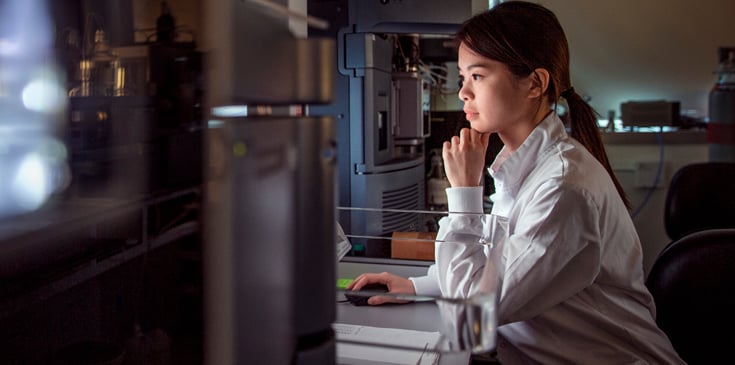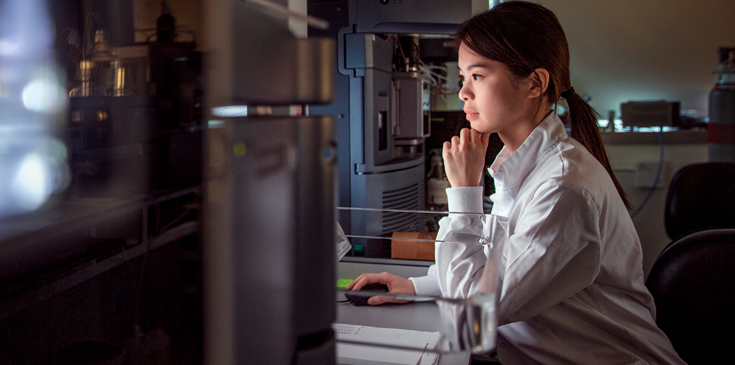
If you’re looking for a certification in forensic science or are interested in learning more about the field for career advancement, you’ll find a few on-campus and online degree options that can help you meet your goals.
Degree Options: Master of Forensic Sciences vs. a Graduate Certificate in Forensic and Crime Scene Investigations
When you begin your search for a forensic science program, you might come across both certificate and degree programs. For example, National University offers a master of forensic science online and a Graduate Certificate in Forensic and Crime Scene Investigations. How do you decide which is the right path to certification in forensic science? Let’s take a closer look at each option:
The Graduate Certificate in Forensic and Crime Scene Investigations can prepare anyone to enter this exciting field, but it’s especially geared toward current law enforcement and related professionals looking to expand their skills and knowledge. For example, this certificate may appeal to:
- Attorneys.
- Detectives.
- Evidence technicians.
- Judges.
- Law enforcement officers.
- Nurses.
The graduate certificate requires fewer courses than a full master’s degree program. Classes focus on human anatomy, cause of death/pathology, crime scene investigation, digital evidence, and law and criminal procedure.
The graduate certificate can also be a step toward a master’s degree. For example, those who complete the certificate program at National University may be able to apply some or all of those academic credits toward a master’s degree.
The Master of Forensic Sciences at National University involves more coursework, which means it takes a deeper dive into procedures and processes related to investigation and analysis. Like most graduate degrees, a master of forensic science online will require a research project. At National, students also have the opportunity to specialize in one of two areas: criminalistics and investigation.
Where You Can Work With a Certification in Forensic Science
A forensic science career can open up a number of career options in a variety of professional settings including:
- State crime lab.
- State police.
- Local police.
- County police.
- Fire department.
- Medical examiner’s office.
- Federal agencies.
- Hospitals.
- Private lab.
Job titles and duties can vary, and many forensic science graduates gain additional on-the-job training based on their specific responsibilities. Let’s take a closer look at some more specific roles within the overarching forensics world.
Field Work: The Collectors
Crime scene investigation is the part of forensics that happens in the field. Law enforcement professionals with crime scene and forensics training most often perform this type of fieldwork. The first step in investigating a crime scene, though, is establishing and securing the crime scene itself. Once that’s determined, the CSIs on duty will get to work on such tasks as:
- Documenting the scene and evidence (such as photographs or sketches).
- Finding, collecting, and documenting trace evidence (such as a piece of fabric).
- Preserving, collecting, and recording impressions (such as fingerprints or tire tracks).
- Collecting firearms-related evidence (such as bullet fragments or weapons themselves).
- Collecting DNA evidence (such as hair, blood, or skin).
- Preparing evidence for delivery to the lab.
A crime scene investigator’s work sometimes goes beyond the crime scene; for example, they might attend an autopsy in the medical examiner’s office to gather additional evidence from a body.
Some crime scenes might require specialized expertise and additional training. For example, arson and fire investigators typically have a background as a firefighter or prior law enforcement experience.
Lab Work: The Analyzers
Once evidence is collected, it’s typically taken to a crime lab. (Although, sometimes, materials may be sent to a hospital or private lab depending on the locality or specific situation.) There, technicians and other professionals process and analyze a variety of items or samples collected at the crime scene. This can help link a suspect and victim to each other, link a suspect or victim to a scene, identify a weapon, and other related questions that need answering.
Lab-based forensic science technicians often specialize in specific kinds of evidence; in fact, a lot of crime labs are organized in teams or departments related to that distinct area. Examples could be:
- DNA.
- Serology.
- Blood spatter.
- Fingerprinting.
- Biology.
- Anthropology.
- Toxicology.
- Pathology.
- Firearms/tool marks.
- Digital.
- Documents.
- Trace evidence.
Some of these areas may require additional training or expertise. For example, forensic anthropology often requires a graduate degree in human biology or anthropology. This additional training is needed to examine evidence such as skeletal remains or bone fragments that might help identify a victim.
Other Duties as Assigned
Working in forensic science doesn’t always mean working with evidence; there’s a good amount of paperwork involved, too, such as internal documentation or reports for law enforcement agencies. Forensic science technicians and crime scene investigators often have to appear in court to provide testimony or give a demonstration of a particular action associated with the crime committed.
While forensic science is most associated with law enforcement investigations, the same tools and training can be used in other areas. Archaeologists might enlist a forensic anthropologist or expert in tool marks to help them identify human remains or artifacts. For instance, a number of natural history museums, like the Smithsonian, have forensic anthropologists on staff. In the case of the Smithsonian’s forensic experts, in addition to their historical research and curatorial tasks, often they also are called upon to work with the FBI, State Department, and other agencies to analyze human remains and help solve crimes all around the world.
If you’re looking for professional certification in forensic science, a graduate certificate or master’s degree could be a good fit. Start your research on which one best suits your needs and current background at our Graduate Certificate in Forensic Science and Crime Scene Investigation program page.
